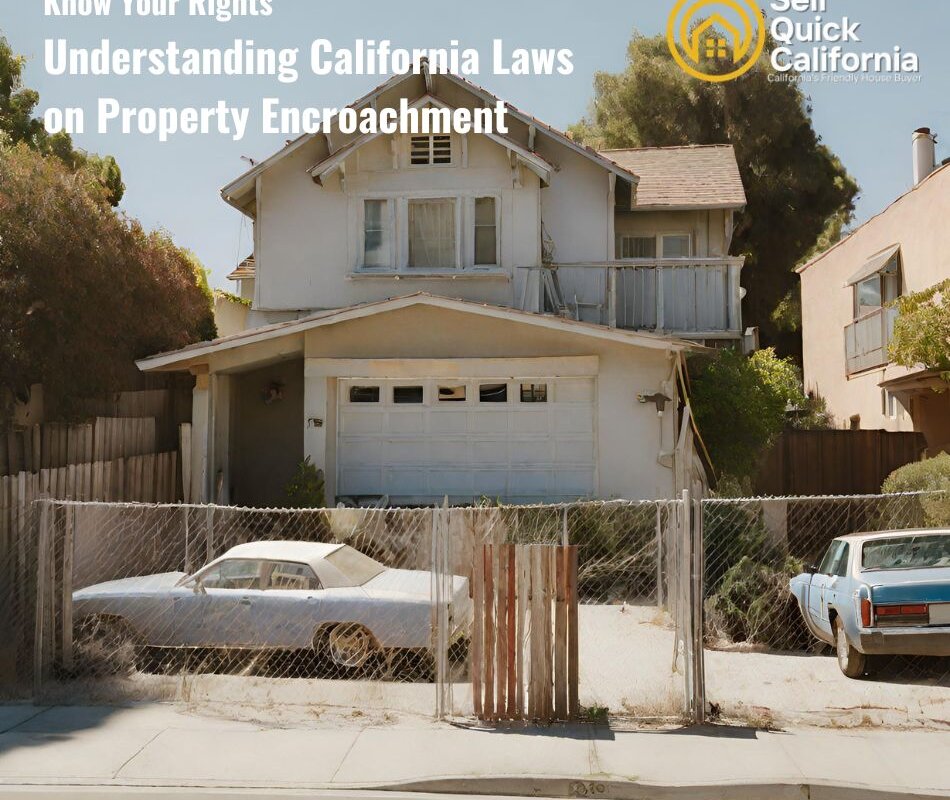There are numerous reasons why you might consider having your home in California appraised. Whether you’re planning to sell or refinance your property, seeking a home equity loan, other types of loans, or contesting your property tax assessments, the need for an appraisal can arise from various circumstances. The anticipation of receiving the appraisal results can be quite exhilarating. After all the effort spent in compiling necessary documents and coordinating the appraisal appointment, the prospect of getting your questions answered is indeed promising. However, it’s important to pause and consider potential obstacles. A common issue encountered during the appraisal process is property encroachment.
Addressing encroachment issues on your California property might seem daunting, but at Sell Quick California, we want to ensure you’re informed about your options. In cases where resolving an encroachment issue is beyond your financial capacity, we’re here to help by purchasing your house quickly for cash. We’ll take care of any easement problems ourselves. Why do we do this? Because at Sell Quick California, offering fast, cash solutions for houses is our specialty. Below, you’ll find detailed information on how homes in California might be impacted by encroachments and what to expect if your property is affected.
What Is An Encroachment In Real Estate?
In the realm of real estate, an encroachment, occasionally known as encroaching land, is identified as any structure or alteration on your property that overlaps onto your neighbor’s property. This could range from minor infractions, like a fence post that juts over the boundary line, to more significant invasions, such as a driveway portion that encroaches onto your neighbor’s territory. Sometimes, encroachments can be on a larger scale, for instance, a swimming pool constructed too near to the boundary or an extension that sprawls beyond the limit.
Are easements considered encroachments?
Easements, at their core, are akin to encroachments because they entail a property owner extending features over a neighbor’s land, much like encroachments do. The key distinction lies in the fact that encroachments are unauthorized and often go unnoticed, whereas easements represent encroachments that have been identified, with both parties agreeing to their continued presence and use.

How to identify if there is an encroachment on your property
If you’re concerned that there might be an encroachment on your property, there are several steps you can take to verify this:
First, determine your property boundaries. This task is straightforward if you possess a survey of your property. If not, you can attempt to locate a survey online or at your local library. Once you’ve established where your property lines are, thoroughly examine the structures or modifications in question. If these indeed encroach upon your property, immediate action is required to rectify the situation. This could involve negotiating with the neighbor or resorting to legal avenues. It’s crucial to act promptly to safeguard your property rights. Alternatively, you can choose to sell your property with the encroachment as-is to Sell Quick California and receive FAST CASH!
What if your property is encroaching on someone else’s land?
If you discover that your property extends onto someone else’s land, it’s crucial to address the issue promptly. For minor encroachments, you might simply need to adjust your fence or modify your landscaping. However, for more substantial encroachments, resolution might require significant effort and expense, especially if the affected neighbor is not amenable to easy solutions. In such cases, financial compensation or even purchasing additional land from your neighbor could be necessary, particularly when dealing with permanent structures like pools or sheds. Acting swiftly is essential to prevent legal complications.
Avoid the hassle and expense by selling directly to Sell Quick California!
Who to contact regarding encroachment issues?
When facing encroachment on your property, start by discussing the issue with your neighbor. You might resolve it through an agreement on an easement or sharing the cost of removing the encroachment. If negotiations fail, turn to your local planning department or building inspector, who can determine if the encroachment violates any regulations. They can assist in finding a resolution. Should the issue persist, consulting an attorney may be your next step to explore legal options and potentially represent you in court. It’s generally best to attempt resolution with your neighbor before pursuing legal action.
The consequences of ignoring an encroachment:
Ignoring an encroachment can lead to several negative outcomes, including losing the right to contest the encroachment, diminished property value, and potential liability for accidents on the encroached land. Prompt action is necessary to protect your property rights and interests.
Encroachment disputes in court:
Encroachment disputes arise when property improvements infringe upon another’s land. If unresolved, these disputes may go to court, where a surveyor will define the property lines. The court can then order the removal of encroachments or compensation for the affected party, potentially including legal fees and court costs.
Timeframe for court decisions in encroachment cases:
Encroachment cases can take months or longer to resolve in court due to the comprehensive review of evidence, legal considerations, and potential need for expert testimony. The process is thorough, contributing to the extended duration before a decision is reached.
Selling a house with encroaching land:
Selling a house with encroachments is possible, though it may complicate the process. Disclosures to potential buyers may extend the sale timeline and affect the selling price. Buyers might request encroachment resolution before closing. Awareness of the potential impact on the sale is crucial.
Sell Quick California: The Fast, All-Cash Solution to Property Encroachment:
Sell Quick California offers a swift, all-cash buying option for homes with encroachment issues, providing an immediate solution to your dilemma. We handle the encroachment correction post-sale, offering a fast closing process due to our all-cash transactions.
Contact Sell Quick California to learn how selling your home for cash can save you time and money, effectively resolving your encroachment challenges without the hassle.

